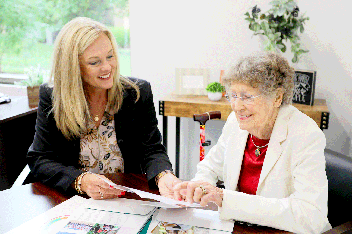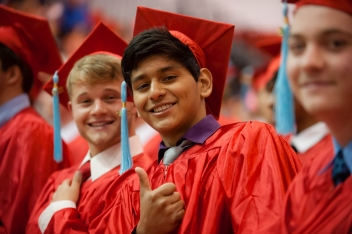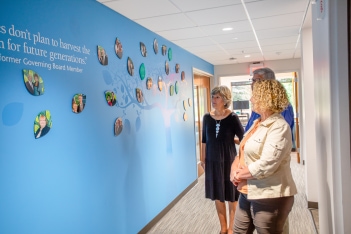
Michael M. Parks
Last fall, when I first introduced in my column a series of conversations focused on equity, I had no idea that just a few months later we would say goodbye to our dear friend and featured expert John E. Moore, Sr. A co-founder of the African-American Community Fund and the first African-American to serve on the Foundation’s Governing Board and as its chair, John was involved in countless community efforts to bridge the gap on racial equity for more than 50 years. It was a cause he remained committed to until his passing in January, just four days shy of his 98th birthday.
Many of the community efforts the Foundation has been involved with over the last half-century came to fruition because of John’s encouragement. His leadership paved the way for initiatives such as the Diversity Task Force, the Commission on Minority Inclusion and the African-American Community Fund of The Dayton Foundation, which has grown to include nearly 200 funds and awarded more than $3 million to nonprofit organizations since 1992. I am grateful to John for his leadership and counsel that has laid the framework for this work that will help to level the playing field for minorities and the underrepresented in our community. Read more about John’s work to enhance Greater Dayton for all of our region’s citizens here.

For my second column focused on equity and inclusion, I talked with William Gillispie, a Dayton Foundation Governing Board member and retired Deputy City Manager for the City of Dayton. William was a close colleague of John Moore and worked with him on countless community efforts, including the Commission on Minority Inclusion, which took root thanks in part to John’s tireless work to advance equity.
You initially co-chaired the Commission with Brother Ray Fitz. Why have your remained involved in its work?
William: Because of the importance and challenges of the work of the Commission on Minority Inclusion, it is necessary to stay committed for the long-term to bring about systemic changes and ensure that diversity, equity and inclusion become a reality in our community.
What is the Commission’s mission and/or the primary focus areas?
William: Its mission is to be a catalyst to strengthening the inclusion of minorities in all facets of life in Greater Dayton. The Commission accomplishes this through convening constructive community conversations and forums between members of the minority and majority community to:
» identify and address community barriers that inhibit the inclusion of minorities, as well as community assets that can be used for greater inclusion of minorities, and
» engage community partners in developing self-sustaining programs that enhance the inclusion of minorities in the Dayton Region.
The challenge is to acknowledge that nothing will change unless things are done differently, and deliberate plans and systems are put into place to change the current equity and inclusion landscape.
– William Gillispie
How has the work of the Commission on Minority Inclusion evolved since its establishment in 2007?
William: The original name of this body was the Diversity Task Force and focused on conversations surrounding diversity in government, employment, public and nonprofit boards, and businesses.
The Diversity Task Force evolved and was renamed the Commission of Minority Inclusion. It kept the same basic mission but refocused on creating initiatives that would bring about systemic change. Included among these efforts are:
» The Minority Business Partnership, which is an economic development initiative, housed with the Dayton Chamber of Commerce, to help grow Dayton’s economy and strengthen area businesses by leveraging Dayton’s minority assets and businesses,
» Miami Valley Works, housed with Goodwill Easter Seals of Miami Valley, which provides employment opportunities and offers services to address barriers for individuals who have been out of the workforce, and
» The Institute for Livable and Equitable Communities, an effort supported by The Dayton Foundation and developed in partnership with the Miami Valley Regional Planning Commission and other community partners, to create programs and systems for a community where everyone is valued, regardless of race, age, income or abilities.
Recent conversations have been about initiatives surrounding generational poverty in our community and how a two-generation approach can bring about a major reduction of poverty in Dayton.
What do you see as the community’s greatest challenges regarding equity and inclusion? How can others become involved to help level the playing field for all?
William: The greatest challenges are getting businesses and institutions to recognize that they have the major role to play in bringing about equity and inclusion. Just saying you want equity and inclusion or having a diversity statement in a business mission is not enough. The challenge is to acknowledge that nothing will change unless things are done differently, and deliberate plans and systems are put into place to change the current equity and inclusion landscape. Every entity in the community must look onto itself and ask what it is doing to bring about change. Is my workforce diverse? Does my product or service reach out to diverse populations? Is my management team committed to equity? What are we doing as an organization to change and improve the diversity, equity and inclusion in our organization?
What are the biggest challenges to implementing diversity and inclusion in the workforce?
William: Institutional inertia! Organizations, by their nature, tend to always do what they have always done. We are seeing more businesses and institutions recognize the importance of diversity, equity and inclusion. However, converting this recognition into actions and changes to remove barriers, improve outreach and outcomes, and to conduct an honest self-assessment are the biggest challenges that must be met in order to create change.
– Michael M. Parks, CFRE President








